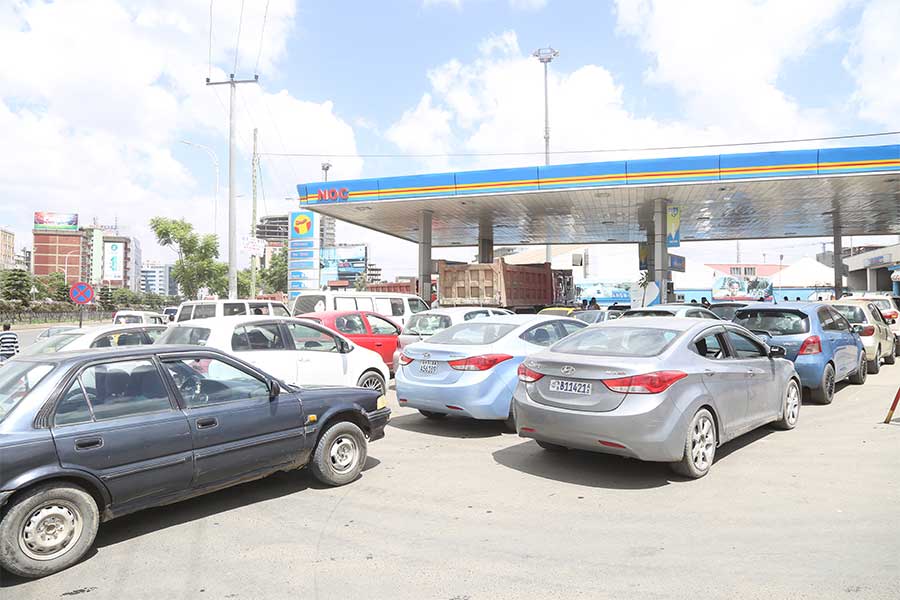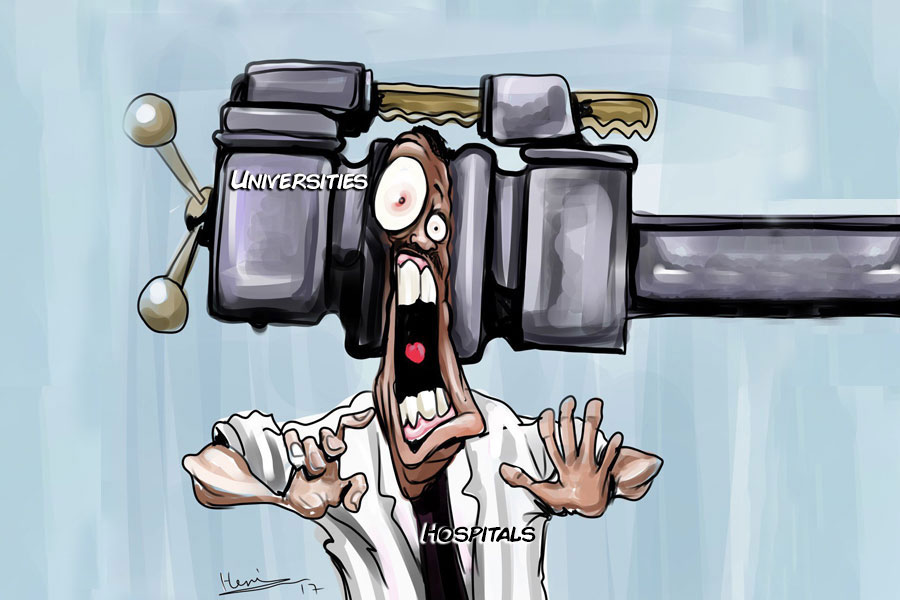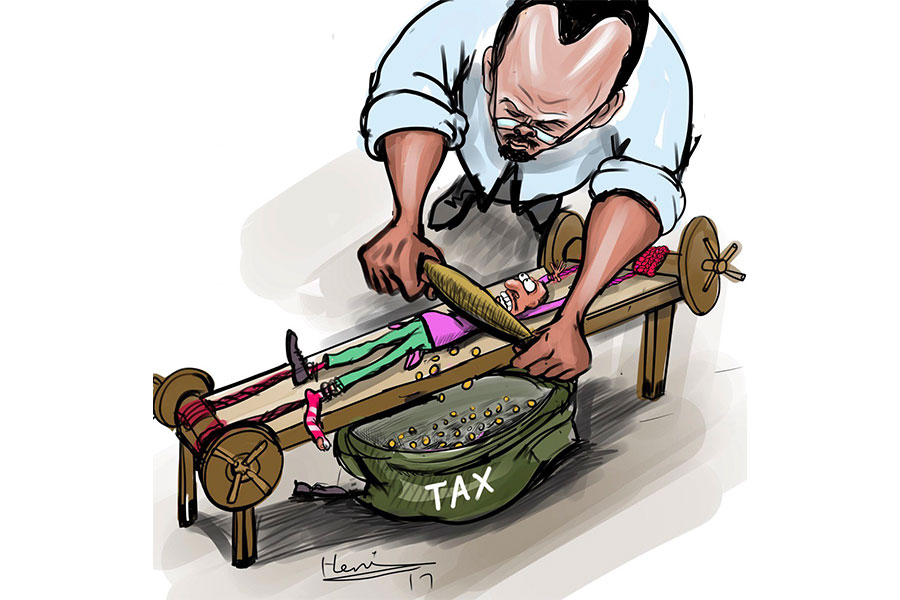
Radar | Feb 26,2022
The last thing Abel Habtemariam, 32, needs is a dip in income. He has been a taxi driver in Addis Abeba for over a decade. Judging by the two blue-and-white minibus taxis he owns, he has done reasonably well for himself. He drives one of the minibuses, and the other is contracted to someone he knows.
Abel has had an average net daily income of around 700 Br from the two taxis. That was up until recently and before his earnings took a nosedive. He wore a sombre expression on a workday afternoon last week, leaning on the steering wheel of his old taxi parked on a narrow street in the Ferensay (Lagasion) Legation area. The worn vehicle may appear nearly as old as the owner but still runs fine.
Abel had many thoughts crossing his mind, not least of which is the 11,000 Br monthly payment he has to make to Awash Credit & Saving in the coming week. He borrowed over a quarter of a million Birr from the microfinance institution to buy his second minibus. Other recurrent expenses, such as 6,000 Br in rent and costs for buying diapers for one of his two children, were thoughts that made him restless.
With the minibus filled with 12 passengers, Abel started his engine and drove along Angola Street to Sidist Kilo before heading to Arat Kilo. He was careful to take his foot off the pedal when going downhill, letting gravity do the work. The intention was to save fuel. He discharged all passengers at Arat Kilo and took the road to Piassa, hoping to fill his tank at one of the gas stations dotted along Adwa Street. Unfortunately for Abel and almost half a million drivers in the capital, the queues that have appeared at pumping stations over the past couple of weeks were much of a daily ordeal.
Abel refused to line up at two stations where the queues were particularly long. A third had posted a sign reading "No Benzene."
Abel would have visited a pumping station and loaded up on 500 Br worth of benzene each day. However, since an unexplained fuel shortage gripped the capital two weeks ago, he was practically forced to stop working. He braved the queues on two occasions over the past fortnight but ended up wasting up to four hours each time. Were he on the road, Abel could have used the hours to make over 300 Br. He no longer drives his usual route from Ferensay to Megenagna, on which he collects 10 Br from each passenger, grossing around 1,000 Br a day.
Instead, Abel rations his fuel to continue providing transport to a group of students at Lideta Catholic Cathedral School. Each pays 450 Br a month for rides to and from school to their neighbourhood in Ferensay. Failing to fill up on benzene that day, Abel headed directly to the school to pick up his young passengers, although they would have still been attending classes at that time of day.
“You've no idea how depressing this is,” he said.
Depressing? It could be. But lines at pumping stations are not a new phenomenon to Addis Abeba. Long queues snaking in neighbourhoods were seen in the lead up to and following fuel price retail price adjustments in January and February last year. However, the reason for the lines then was plain old consumer panic, with drivers looking to save a couple of hundred Birr before stations upped their prices.
This time around, what swelled the lines remains unclear, but the queues at gas stations throughout the city are here to stay. Several stations have run out of fuel to pump.
Vehicles lined up at a gas station on Menelik II Avenue, near Mesqel Square. Over the past couple of weeks, drivers have been dealing with wait times of up to four hours to fill their tanks.
A gas station - National Oil Company (NOC) - in the Addisu Gebeya area of northern Addis Abeba has seen an upsurge in demand over the past two weeks. Its owner, Ephrem Tesfaye, who also serves as a board member of the Petroleum Dealers' Association, does not think vehicles lined up before his station a good sign for business. This station sells up to 25,000lt during an average day. But that has gone up to 35,000lt, mostly benzene. However, selling fuel is often a secondary source of income.
Compared to what they get from selling oil and lubricants, the 0.23 Br profit margins from a litre are less attractive to Ephrem and most other dealers. Car wash and cafe services fill in for additional income. The crowd and jam at his station scare away customers looking to visit for other purposes.
“Services to our usual clients are disrupted on such occasions,” he said.
Sales revenues from oil and lubricant products have dropped by two thirds. Yet, Ephrem is uncertain about what is causing the disruptions in fuel supply. He hears from drivers who visit his station of speculations, including talk of further adjustments to fuel prices.
Last December, unable to bear the burden of subsidies, the federal government increased the price of benzene by 23pc to 31.74 Br a litre. For diesel, the retail price went up by 25pc to 28.94 Br.
Barely a month later, the authorities announced fuel subsidies are to be lifted entirely through a gradual process beginning in July. An estimated 300,000 vehicles providing public transport services, excluding ride-hailing, will see a 10pc bi-annual rise in prices for five years. The remaining one million vehicle owners will be subjected to quarterly increases of 25pc for one year.
“Even after the speculation stops, supply interruptions will continue for some time,” Ephrem foresees.
There has not been an official explanation from the authorities that justifies the disruptions. Industry players point their fingers at the shortage of fuel trucks and a lack of appetite from truck owners to engage in fuel distribution. For a long time now, leaders of the Ethiopian Liquid Cargo Transport Owners’ Association have lobbied the government to increase the fuel transportation tariff, reviewed every year.
A year ago, the Ministry of Trade had estimated transport fees of around 75,000 Br a truck to transport fuel from ports in Djibouti to the capital. A single truck has a carrying capacity of 45,000lt of fuel. A new Italian-made IVECO fuel truck goes for 12 million Br, up from around five million Birr almost five years ago. With growing expenses and high prices on parts, the lobby group estimates 115,000 Br to keep a fuel truck running a trip.
A single tyre of a brand considered "cheap" was 17,000 Br last year. It has jumped to 28,000 Br since. Operating with 22 to 24 tyres, a truck makes two or three trips from Djibouti to Addis Abeba in a month. With each tyre having a service period of eight months, truck owners can spend up to 40pc of annual income on tyres alone. Higher quality brands from Japan and Europe have a price tag of around 40,000 Br a tyre. These may serve them for a year.
Truck owners are compelled to pay a 120,000 Br annual insurance fee. Added to fuel expenses, which have increased by around 2,000 Br a trip since the latest price adjustments, truck owners say the business is no longer viable.
“It's unbearable for fuel truck owners,” said Yibeltal Kassie, board member of the Association.
Yibeltal and other lobby group leaders have seen a significant drop in the number of trucks operational in recent weeks. Accurate numbers are hard to come by. But individuals close to the issue estimate that close to 40pc of the 3,500 fuel trucks in the country are sidelined. Some had already converted to dry cargo carriers before the authorities proscribed the action earlier this year.
“If anyone wants to invest in the trucking business, they would prefer dry cargo transportation,” Yibeltal said.
Dry cargo transporters operate based on deals with clients, unlike trucks that transport fuel whose tariff is set by the authorities.
“If the government can’t come up with a solution in a short period, it'll be catastrophic,” Yibeltal warns.
The Association is holding discussions with officials of the Ministry of Trade & Regional Integration. An official at the Ministry of Trade, who requested anonymity as the issue is unresolved, confirmed that a committee led by his office is in discussions with the Association's leaders.
“It's not only a tariff adjustment that is needed,” said the official. “The country also needs additional trucks.”
Matiwos Ensermu (PhD), associate professor of logistics and supply chain management at Addis Abeba University, contends the value transporters add to the service sector should be given due attention by the government. He observes the high running costs and the old age of many vehicles have put the future of fuel distribution at risk.
A study conducted in collaboration with the Association and the Ministry of Transport & Logistics revealed that over half of the available fuel trucks are over three decades old. The expert recommends officials introduce incentives to attract prospective investors to an industry with high overhead costs and thin margins.
Authorities claim that truck owners began lodging official complaints immediately after the federal government cracked down on contraband fuel trade last month. They have introduced a quota-based distribution regime to the Oromia and Somali regional states after identifying dozens of towns as hubs for illicit trade.
“The speculation that some fuel trucks had been involved in the contraband market to offset their losses is most likely true,” said the official.
Senior executives of the Ethiopian Petroleum Supply Enterprise (EPSE) confirmed no drop in fuel supplies. Tadesse Hailemariam, chief executive officer (CEO) of the Enterprise, says imports remain unchanged at an average of 2.7 million litres a day. The state-owned Enterprise supplies fuel - on a subsidised rate - to close to 42 oil companies, which distribute petroleum through 1,200 pumping stations. Ethiopia imported 3.2 million tonnes of benzene, diesel and kerosene at the cost of 51 billion Br in 2019/20.
Petroleum products are transported daily from ports in Djibouti; the Enterprise incurs no demurrage fees due to late unloading, according to the CEO. He disclosed that over 300 trucks have been transporting fuel each day over the last few weeks.
“The oil companies are responsible for checking if the fuel that is distributed to their stations is, in fact, in the right place,” he told Fortune.
Matiwos points to digitalisation as a possible solution.
“Tracking the movement of trucks is one of the major assignments that remain unaddressed," he said.
It remains to be seen whether Trade Ministry officials will settle on a deal with the transporters. But there is no telling when the queues at pumping stations will subside. For now, drivers like Abel will have to bite the bullet and spend long hours lined up for fuel. Abel says he will not resume his regular route to Megenagna until things settle down.
“I’m only ferrying the students," he said.
PUBLISHED ON
Feb 12,2022 [ VOL
22 , NO
1137]

Radar | Feb 26,2022

Viewpoints | Dec 19,2018

Viewpoints | Dec 02,2023

Fortune News | Aug 29,2020

Radar | Oct 01,2022

Radar | Apr 26,2019

Fortune News | Jun 13,2025

View From Arada | Nov 02,2024

Radar | May 07,2022

Fortune News | May 08,2022

Dec 22 , 2024 . By TIZITA SHEWAFERAW
Charged with transforming colossal state-owned enterprises into modern and competitiv...

Aug 18 , 2024 . By AKSAH ITALO
Although predictable Yonas Zerihun's job in the ride-hailing service is not immune to...

Jul 28 , 2024 . By TIZITA SHEWAFERAW
Unhabitual, perhaps too many, Samuel Gebreyohannes, 38, used to occasionally enjoy a couple of beers at breakfast. However, he recently swit...

Jul 13 , 2024 . By AKSAH ITALO
Investors who rely on tractors, trucks, and field vehicles for commuting, transporting commodities, and f...

Jul 26 , 2025
Teaching hospitals everywhere juggle three jobs at once: teaching, curing, and discov...

Jul 19 , 2025
Parliament is no stranger to frantic bursts of productivity. Even so, the vote last w...

Jul 12 , 2025
Political leaders and their policy advisors often promise great leaps forward, yet th...

Jul 5 , 2025
Six years ago, Ethiopia was the darling of international liberal commentators. A year...